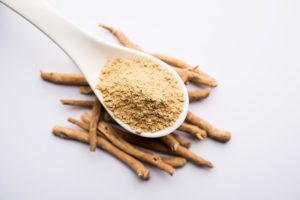Valerian Root for Sleep
- Valerian root is a popular herbal sleep aid available in tea, capsules, and tinctures.
- Valerian root may help improve sleep and reduce anxiety, but is not advised as a treatment for long-term insomnia.
- As a dietary supplement, valerian root is not closely monitored by the FDA.
- Valerian root is considered a safer alternative to prescription sleep aids.
Sleep loss is a worldwide problem . Health experts suspect that insufficient sleep prompts or exacerbates many serious health issues, which is why getting optimal sleep should be a top priority.
If you are one of the many people who doesn’t sleep enough or has trouble sleeping, you might wonder if natural sleep aids can help you. We explore valerian root, a popular natural sleep aid, covering its impact on the body, potential side effects, and recommended dosage.
What Is Valerian Root?
The valerian plant is an herb native to Asia and Europe, but it can also be found in North America. The root of the plant is used for different purposes and has a distinct scent that many people find unpleasant.
Valerian root’s medical usage dates back to ancient Greece and Rome. Early on, people treated migraine, tiredness, stomach cramps, and insomnia with valerian. Currently, people primarily take valerian to help address insomnia, anxiety, premenstrual syndrome (PMS), menopause, depression, and headaches.
Is Your Troubled Sleep a Health Risk?
A variety of issues can cause problems sleeping. Answer three questions to understand if it’s a concern you should worry about.
When used as a dietary supplement , valerian root is generally dried, then made into a tea, tincture, capsule, or tablet. These forms of valerian root are available without a prescription in pharmacies, grocery stores, and online. Valerian root supplements are very popular natural sleep aids, and they are commonly used in European countries such as France, Germany, and Sweden. In a survey conducted in the U.S., more people reported taking valerian root for sleep compared to melatonin.
The safety and efficacy of supplements is not closely monitored by the U.S. Food and Drug Administration (FDA). Shoppers should take additional measures to make sure they are purchasing reputable products.
How Does Valerian Root Work?
Valerian root contains multiple chemical compounds that may impact the human brain and body, but researchers haven’t completely pinpointed which compounds affect us. Most likely, multiple components act together to provide effects. Researchers have identified the following active compounds in valerian root:
- Iridoids , also called valepotriates
- Essential oils, including valerenic acid and valeric acid
- Lignans
- Flavonoids
- GABA (at low levels)
Effects on the Body
More research is needed, but valerian root may impact the body in a variety of ways. For example, the iridoids found in valerian root may act as anti-inflammatories and inhibit the expression of specific genes. Studies of mice suggest that valerian root can ease pain in the body through flavonoids, which inhibit the creation of nitric oxide.
Effects on the Brain
When it comes to the brain, researchers have primarily studied how valerenic acid in valerian root affects GABA receptors, a type of neurotransmitter in the brain. The effect on GABA receptors is at least partially how valerian root supplements ease anxiety, though its impact could vary from person to person depending on their sex and age. Valerian root also likely impacts serotonin receptors, which are involved in mood and sleep.
Valerian root has also been found to reduce brain activity in the motor cortex in response to stimulation, as well as change how brain waves in different parts of the brain work together in response to stress and anxiety.

Can Valerian Root Help You Sleep?
After analyzing 60 research studies published over nearly 40 years, researchers determined that valerian root can likely improve sleep and reduce anxiety in many people. Valerian root supplements have been found to help people fall asleep faster, improve their sleep quality, and spend more time in a deep sleep stage.
However, some studies found that valerian root had no effect or a statistically insignificant effect. To see improvement, people might have to take valerian root regularly, rather than once in a while or as needed.
One thing to keep in mind is that the American Academy of Sleep Medicine (AASM) advises against the use of natural sleep aids, including valerian root and melatonin, when treating chronic insomnia , due to the lack of evidence for their effectiveness and safety. Chronic insomnia is a sleep disorder in which a person has trouble falling or staying asleep three more nights per week for at least three months . During this time, they also experience daytime fatigue or difficulty concentrating.
Valerian Root Side Effects
Generally, taking valerian root supplements is thought to produce fewer side effects than taking sedative or hypnotic medications for sleep.
Most studies of valerian root for sleep found that participants experienced no adverse effects, or mild side effects at comparable rates to groups taking a placebo. However, other studies have found that valerian root may produce the following side effects in some people:
- Headache
- Upset stomach
- Feelings of uneasiness
- Heart rate changes
- Insomnia
- Drowsiness
- Dry mouth
- Vivid dreams
The effects valerian root has on a person may depend on the dosage taken.
Is Valerian Root Safe?
Many studies have found valerian root to be a safe natural sleep aid. Researchers have found taking valerian root regularly for up to 28 days doesn’t cause problems for most adults.
People taking sedatives or other anti-anxiety or sleep medications should avoid valerian root. There’s a chance these drugs could interact or become too sedating when combined. Also, those who are pregnant or nursing and children under the age of 3 shouldn’t take valerian root because risks haven’t been studied in these groups yet.
Studies of the longer-term safety of valerian root supplementation haven’t been conducted. The American Academy of Sleep Medicine also recommends against using valerian root for chronic insomnia because they’ve determined there isn’t enough research demonstrating its safety or efficacy.
How to Take Valerian Root for Sleep
There is no official dosage recommended for people wanting to take valerian root. Most research studies of valerian root’s effect on sleep have people take 300 to 600 milligrams, once per day, on a regular basis.
When taking a supplement, it’s often best to start with a low dose, then gradually increase it over time, if needed. Talk to your doctor before starting valerian root to discuss dosage and if it’s the best sleep aid for you.
When to Talk to Your Doctor
Since there are no official guidelines regarding natural sleep aids, consider speaking to your doctor before taking one. Whether you’re interested in valerian root, melatonin, ashwagandha, or cannabis, your doctor can advise on potential risks and side effects, as well as a recommended dosage.
If you experience more than the occasional trouble sleeping and think you might have a sleep disorder, make an appointment with your doctor instead of self-treating with natural sleep aids. A variety of sleep disorders disrupt sleep and cause daytime tiredness. Your doctor will ask questions and, if necessary, order tests to determine what is the root cause of your sleep issues so you can receive proper treatment.
Medical Disclaimer: The content on this page should not be taken as medical advice or used as a recommendation for any specific treatment or medication. Always consult your doctor before taking a new medication or changing your current treatment.

Still have questions? Ask our community!
Join our Sleep Care Community — a trusted hub of sleep health professionals, product specialists, and people just like you. Whether you need expert sleep advice for your insomnia or you’re searching for the perfect mattress, we’ve got you covered. Get personalized guidance from the experts who know sleep best.
References
12 Sources
-
Chattu, V. K., Manzar, M. D., Kumary, S., Burman, D., Spence, D. W., & Pandi-Perumal, S. R. (2018). The global problem of insufficient sleep and its serious public health implications. Healthcare, 7(1), 1.
https://pubmed.ncbi.nlm.nih.gov/30577441/ -
National Center for Complementary and Integrative Health. (2020, October). Valerian., Retrieved November 27, 2021, from
https://www.nccih.nih.gov/health/valerian -
National Institutes of Health Office of Dietary Supplements. (2013, March 15). Valerian., Retrieved November 27, 2021, from
https://ods.od.nih.gov/factsheets/Valerian-HealthProfessional/ -
Zare, A., Khaksar, Z., Sobhani, Z., & Amini, M. (2018). Analgesic effect of valerian root and turnip extracts. World Journal of Plastic Surgery, 7(3), 345–350.
https://pubmed.ncbi.nlm.nih.gov/30560075/ -
American Academy of Sleep Medicine. (2007, July 1). Journal SLEEP: Many insomniacs turn to valerian and melatonin to help them sleep., Retrieved November 27, 2021, from
https://aasm.org/journal-sleep-many-insomniacs-turn-to-valerian-and-melatonin-to-help-them-sleep/ -
Shinjyo, N., Waddell, G., & Green, J. (2020). Valerian root in treating sleep problems and associated disorders—A systematic review and meta-analysis. Journal of Evidence-Based Integrative Medicine, 25, Article 2515690X20967323.
https://pubmed.ncbi.nlm.nih.gov/33086877/ -
Wang, C., Gong, X., Bo, A., Zhang, L., Zhang, M., Zang, E., Zhang, C., & Li, M. (2020). Iridoids: Research advances in their phytochemistry, biological activities, and pharmacokinetics. Molecules (Basel, Switzerland), 25(2), 287.
https://pubmed.ncbi.nlm.nih.gov/31936853/ -
Becker, A., Felgentreff, F., Schröder, H., Meier, B., & Brattström, A. (2014). The anxiolytic effects of a Valerian extract is based on valerenic acid. BMC Complementary and Alternative Medicine, 14, 267.
https://pubmed.ncbi.nlm.nih.gov/25066015/ -
Mineo, L., Concerto, C., Patel, D., Mayorga, T., Paula, M., Chusid, E., Aguglia, E., & Battaglia, F. (2017). Valeriana officianis root extract modulates cortical excitatory circuits in humans. Neuropsychobiology, 75(1), 46–51.
https://pubmed.ncbi.nlm.nih.gov/29035887/ -
Roh, D., Jung, J. H., Yoon, K. H., Lee, C. H., Kang, L. Y., Lee, S. K., Shin, K., & Kim, D. H. (2019). Valerian extract alters functional brain connectivity: A randomized double-blind placebo-controlled trial. Phytotherapy Research: PTR, 33(4), 939–948.
https://pubmed.ncbi.nlm.nih.gov/30632220/ -
Sateia, M. J., Buysse, D. J., Krystal, A. D., Neubauer, D. N., & Heald, J. L. (2017). Clinical practice guideline for the pharmacologic treatment of chronic insomnia in adults: An American Academy of Sleep Medicine clinical practice guideline. Journal of Clinical Sleep Medicine, 13(2), 307–349.
https://pubmed.ncbi.nlm.nih.gov/27998379/ -
American Academy of Sleep Medicine. (2014). International Classification of Sleep Disorders — Third Edition (ICSD-3) (Online).
https://aasm.org/






















